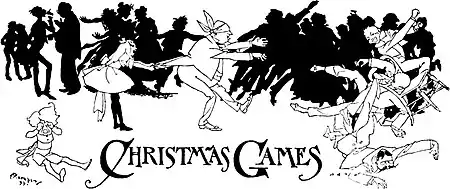
BY W. L. ALDEN.
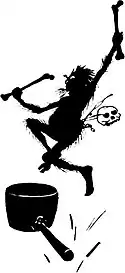
OUR ANCESTOR.Why people should celebrate Christmas by playing games, is at first sight by no means plain. What possible connection is there between the Christmas anniversary and the noise, confusion, and laughter of Christmas games? When the Queen’s birthday arrives we do not feel it to be necessary to have our hair cut, or to sit on our top-hats and smash them. The recurrence of Whit Sunday does not bring with it an irresistible desire to break the household crockery or to kill the cat. Yet it would be quite as rational to do these things on the anniversaries just mentioned as it is to play games at Christmas. What, then, is the explanation of our universal custom of celebrating Christmas with games?
It will be noted that an invariable characteristic of Christmas games is their noisiness. The game with which the mistletoe is 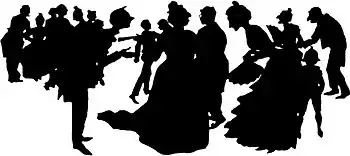
“WE IMITATE THE SAVAGE.” associated is necessarily noisy; Sir Roger de Coverley involves more or less uproar of an alleged musical character; and blindman’s-buff is little better than an insurrection. A quiet Christmas game is apparently never played. We thus see that noise is an essential feature of Christmas games, and this fact will probably give us a clue to their origin.
The savage has but two ways of celebrating any important event—either he over-eats himself, or he makes a horrible noise. If he can do both, so much the better. When 
“A LARGE NUMBER OF PEOPLE OF BOTH SEXES.” Christmas arrives we imitate the savage with disgraceful fidelity. We gorge ourselves with roast goose or roast turkey, and we play the noisiest games that can be played outside of the football ground. Of course, we are unconscious that we are imitating savages; our conduct is simply the result of heredity. Thousands of years ago our remote ancestor, the cave man, celebrated his chief holiday—say the anniversary of the day on which he killed and ate his worst enemy—by feasting on boiled leg of rhinoceros, and by subsequently drumming as loudly as possible on the upturned and empty kettle. In these days we are not cannibals, but at Christmas we approach as closely as possible to cannibalism by eating too much roast goose. We no longer take pleasure in beating on the bottom of a copper kettle, but 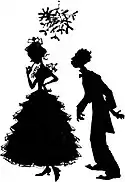
THE WRONG GIRL. we feel instinctively that our greatest festival must be celebrated with noise. Thus we can explain, by the theory of heredity, the origin of our two chief Christmas customs. And the explanation is doubtless right, for, as we all know, heredity is now the correct scientific explanation of everything—from the shape of our skulls to the way in which we lie in our beds.
While we can thus account for the noise of Christmas games, we have not yet accounted for the games themselves. Why, when there are so many ways of producing noise, do we select games as the appropriate method of producing a satisfactory Christmas uproar? 
SWEET AND INEXPRESSIBLE RAGE. What are the conditions necessary to Christmas games? They are—first, the presence of a large number of persons of both sexes, and second, their desire to endure one another with decency. Take twenty people of assorted sexes and shut them up in the drawing-room on Christmas night, and each one feels that he must do something to enable him to live through the evening. To sit till and reflect that the quiet and secluded corner, which the safe digestion of the Christmas dinner so imperiously demands, is unattainable, and that the evening must be spent in conversing with uninteresting people upon tiresome themes, is something that no man will willingly do if there is a possible alternative. Games are intended to supply this alternative, and to enable the Christmas sufferer temporarily to forget his sorrows. Probably they accomplish this end to some extent, but it may be fairly questioned whether the remedy is not worse than the disease.
The supposition that there can be any pleasure derived from playing Christmas games cannot be for a moment entertained. We all know that it is not true. Take the ceremonies of the mistletoe—ceremonies which have no real title to the name of game, although they are arbitrarily classed under that head. Can there be any pleasure in kissing the wrong girl under the mistletoe? Of course, it will be said that you may kiss the right girl, but if she is only one among a dozen girls the proportion of undesirable kisses to the one desired kiss is preposterously large. Then, can a man take any pleasure in seeing the girl of his heart kissed by other men? No matter how heavily he may have drugged himself with roast goose, the spectacle is one which fills him with secret and inexpressible rage.
There may be a sort of mild pleasure in 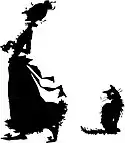
AUNT JANE. seeing a man whom you cordially detest groping around the room with a bandage over his eyes, and occasionally abrading himself against the sharp corners of the furniture, but it is a pleasure wholly unworthy of a Christian man. The game of blindman’s-buff is exhausting, undignified, and certain to involve one in difficulties with the girls whose dresses are torn by the unconscious feet of the blindfolded man. It is true that there are redeeming points, even in blindman’s-buff; for is there not a case on record of a man who, while blindfolded, caught the family cat, and in his excitement mistook the cat’s fur for the back hair of his maiden aunt? His triumphant proclamation that he had caught Aunt Jane induced the latter to change her will the very next day, thereby 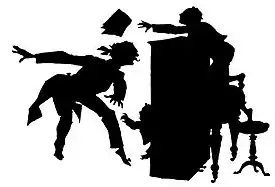
THE SHARP CORNERS OF THE FURNITURE. depriving the blindfolded nephew of a comfortable legacy to which he had looked forward for years. Still, poetic justice seldom overtakes the man who consents to be blindfolded, and those occasions when a Christmas guest finds it possible to extract even the feeblest pleasure from blindman’s-buff are extremely rare.

SIR ROGER DE COVERLEY. Sir Roger is simply an athletic exercise, falsely called a game. It is as tiresome as golf, and nearly as exhausting as cycling. And yet even middle-aged men who have within an hour or two eaten a Christmas dinner, are made to engage in the violent inanities of Sir Roger on Christmas evening. On the following day, when in the agonies of abdominal remorse, a man is ready to take a solemn oath never again to meddle with that fatal sport, but as sure as the next Christmas sees him still alive, he will end Christmas evening with the inevitable Sir Roger.
It may be unhesitatingly asserted that no 
ABDOMINAL REMORSE. one enjoys Christmas games who is more than ten years of age. It need hardly be said that children of that age should be in bed on Christmas evening instead of being permitted to infest the drawing-room. Their enjoyment of Christmas games is, therefore, no excuse for the latter. We might as well excuse bull baiting on the ground that it gives pleasure to the dogs. We play Christmas games solely because an hereditary custom compels us so to do. Nobody who has arrived at years of discretion enjoys them, and ninety-nine people in a hundred detest them.
When we think of the quiet, comfortable games with which Christmas might be celebrated, the objectionable character of our present Christmas games becomes the more apparent. There is the delightful game known as “Two in the Conservatory.” It is played by a young man and a young woman 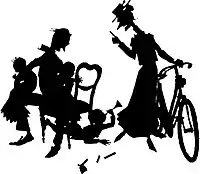
THE LOVER’S REGRET. The two retire to a quiet corner in the conservatory where they are concealed from view by flowers and vines, and there discuss in a low tone such pleasing themes as the Best Route to the North Pole, or the Kinetic Theory of Gases. Any number of young men and young women can play at this simple but charming game 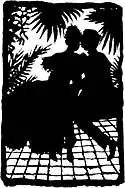
TWO IN A CONSERVATORY. provided a sufficient number of quiet corners can be found in the conservatory. It can even be played on the stairs almost as well as in the conservatory, and the same young man, if he is a sufficiently accomplished player, can play a half a dozen sets with half a dozen different young women in the course of a single evening. The enormous superiority of this game to anything that is done under the mistletoe must be apparent even to the most careless observer. It involves none of the publicity, the romping, and the other disagreeable features of the latter game, though it must be confessed that, in some intances, the loser has had good cause to regret that he ever attempted to play it.
Then there is the pipe game. This is played only by men, but, perhaps, that is one of the advantages of it. The player withdraws to some quiet place, either within or without the house. Having seated himself he fills an ordinary brier-wood pipe with good tobacco, and lights the tobacco with a match. Almost any match may be used, but as a rule the wooden match is used by the best players. 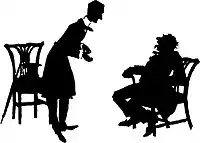
DYSPEPSIA. The player can either finish his game in one innings with the pipe, or he can refill it and enjoy another innings. Men who habitually play this game assert that it is peculiarly adapted for Christmas evening, especially if the Christmas dinner has been a good one. 
THE PIPE GAME. That it is vastly preferable to blindman’s-buff, or Sir Roger, is admitted by nearly all medical men; except, of course, young practitioners, who are anxious to add to the number of their patients, and look upon the usual Christmas games, with their subsequent harvest of sufferers from dyspepsia, as something especially designed for the good of the medical faculty.
I may mention one more admirable Christmas game. It is called Bedfordshire, and is one of the earliest games with which we make acquaintance in our childhood. The player retires from the drawing-room about an hour after dinner is over, and just before the orthodox Christmas games begin. When he reaches his room he removes the greater part of his 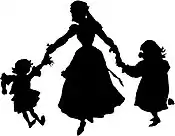
BEDFORDSHIRE. clothing, puts on his night-gown, and after extinguishing the light, gets into bed. There he remains until half an hour before breakfast time on the following morning. This game ought to be a great favourite, and when a man has once learned to play it on Christmas evening, he can never be induced to play any other.
I have suffered much from Christmas games. I have played blindman’s-buff and caught the corner of a particularly hard pianoforte with my forehead. I have undergone the toil of Sir Roger, and caught pneumonia in consequence of being overheated. I have been compelled to kiss girls under the mistletoe who, I am certain, did not want to be kissed 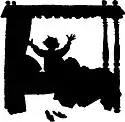
HALF-AN-HOUR BEFORE BREAKFAST. by me, and whom I certainly did not want to kiss. On the other hand, I have the memory of one delightful Christmas Eve which I spent in a rational manner. I was nearly seven hundred miles distant from my home, and I went to dine with a bachelor uncle who warned me that he detested the practice of giving Christmas presents, and uniformly refused to accept any. There was no one at the dinner-table except my uncle and myself, and about eight o’clock that excellent man said to me, “Now, nephew, I’m going
to bed. There is the port, and there are the cigars, and you’ll find plenty of books in the library. Good-night!” The port and the cigars were admirable, and in the library I found a volume of Guy De Maupassant which I had never previously seen. I went to bed at ten o’clock, and I have ever since considered that my excellent uncle’s idea of entertaining Christmas guests was worthy of universal imitation.
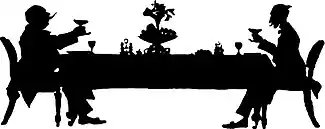
A RATIONAL MANNER.
This work is in the public domain in the United States because it was published before January 1, 1927.
The author died in 1939, so this work is also in the public domain in countries and areas where the copyright term is the author's life plus 80 years or less. This work may also be in the public domain in countries and areas with longer native copyright terms that apply the rule of the shorter term to foreign works.